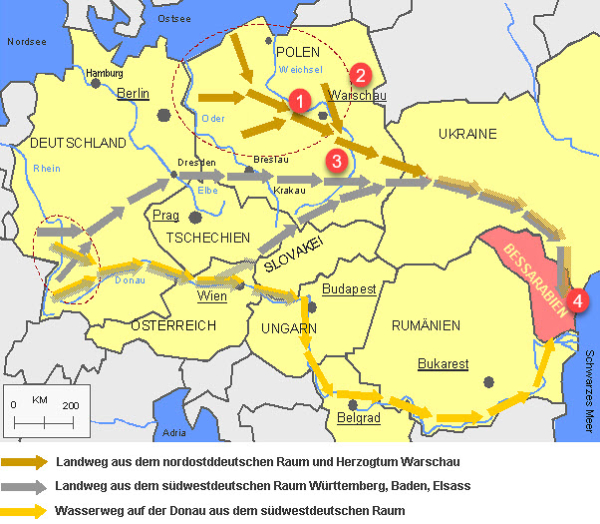_English_
User Tools
Site Tools
Sidebar
Table of Contents
4.2 The onward migration to Krasna begins
Many took the opportunity to escape their misery and start a new beginning. They left their barely acquired homeland in Poland and in 1814 moved from Galicia, South and New East Prussia (territories combined in the Duchy of Warsaw since 1807/1809) to Bessarabia as so-called Warsaw colonists and founded the colony of Krasna.
The onward migrants included Krasna families who were either immigrants or Polish citizens:
- immigrants from south-west Germany
- around 1784/1786 to the district of Zamość:
e.g. Altmeyer, Becker, Dirk, Haupt, Löb, Müller, Petsch, Söhn, Speicher, Ternes, Tokendorf, Zink. - around 1801 - 1804 to South Prussia (possibly also earlier to the Netzedistrict):
e.g. Both, Dressler, Hein, Schlick, Maas - around 1801 - 1806 to New East Prussia:
e.g. Riehl, Ritz, Rückert - immigrated with unknown destination:
e.g. Kuhn, Schultz, Fornwald, Leinz, Bitz, Harsche, Arnold. - around 1800 to the estates of Wilhelm Friedrich Erbprinz von Nassau-Oranien in South Prussia:
e.g. Baldus, Becker, Hartmann, Heidrich, Hein, Müller, Wagner, Wingenbach.
- Polish nationals:
e.g. Ruscheinski, Wuitschik, Ganski, Kletki.
Around 1840, residents from colonies in the Odessa area also moved to Krasna (see section 5.3.5 Arrival of 22 families from Odessa colonies around 1843).
Why German settlers ?
- The Tsar wanted independent peasants who could serve as a model for his Russian peasants.
- Germans were already known to the Russians as colonists in other settlement areas (Volga, Odessa region).
- The Tsar's mother was herself a German.

Belonging to Prussia: (1) South Prussia, (2) New East Prussia
Belonging to Austria: (3) Galicia
Belonging to Russia: (4) Odessa region
Quelle:Von Hartmut Reule, uploaded to Wikipedia.de by Axel Hindemith (User:AxelHH) - here [1], sketch by the author Hartmut Reule with permission, self-processed, GNU-FDL, CC BY-SA 3.0, https://commons.wikimedia.org/w/index.php?curid=3156820
Why did the Tsar want Germans from the Duchy of Warsaw?
- The Tsar knew the bleak situation of the Germans living there. He had become aware of it during Napoleon's pursuit on his retreat from the Russian campaign.
- The Tsar had the best access to the Duchy of Warsaw, his army was there in 1813.
- In addition, there were bans on emigration in most German states in 1813.
Why are they called Warsaw colonists?
Their name is a simplified description of their origin from Poland.
The vast majority of the emigrants came from the area of the Duchy of Warsaw. But some also came from areas further north, e.g. Prussian West Prussia, Pomerania or Mecklenburg.
We must also not forget that it was not only Germans who moved on. Some Polish families moved away with the Krasna group. This may underline the hardship that existed at that time: even Poles left their own country.
The “Statistical News about the Warsaw Colonies Settled in Bessarabia or Budshak Proper” from 1823 describes them like this:
“The Warsaw colonies in Budshak, which consist of 13 settlements, of which 12 are now (1818) established, and one is still to be established, received their general name from the Warsaw emigrants who, after the last unification of Bessarabia with Russia, immigrated from 1814 to 1818 from the then Grand Duchy of Warsaw to this country (where there were Turkish-Tartar possessions until 1806).”

